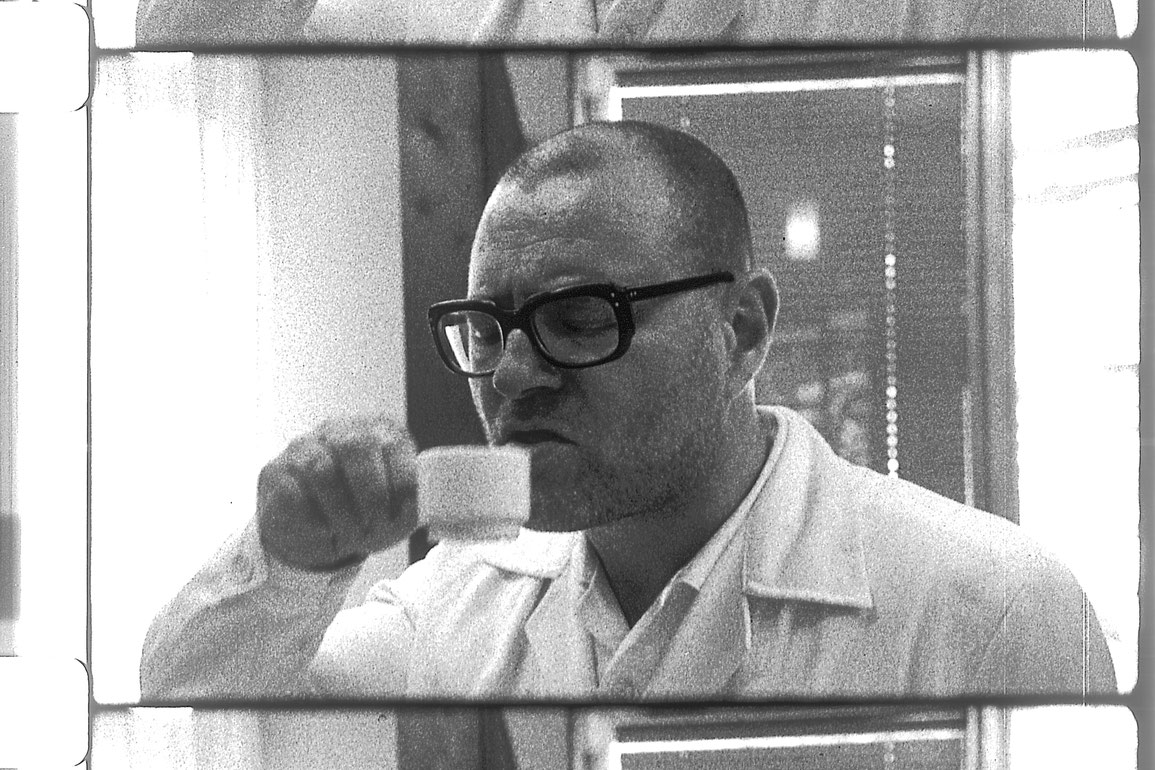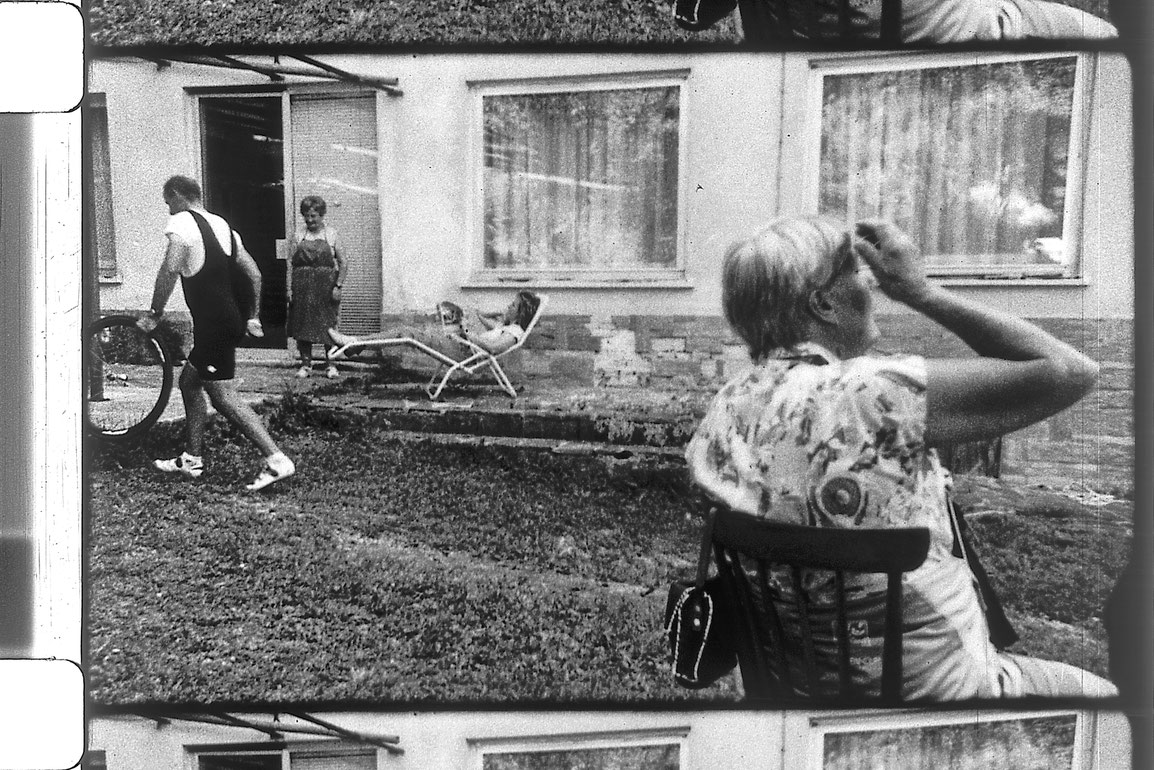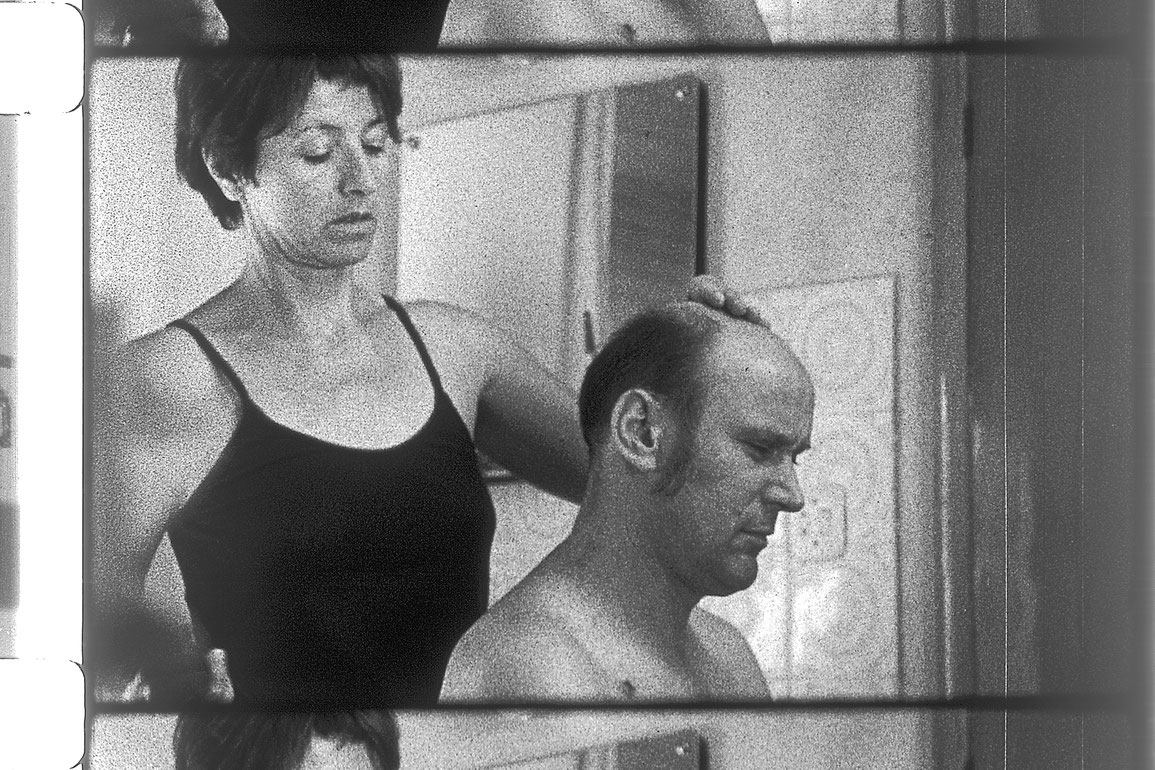Hotel Roccalba
Wo sie sich befinden, ist nicht so wichtig. Was sie gerade tun, eigentlich auch nicht. Der Ort - ein italienisch anmutendes Hotel, vermutlich höher gelegen - ist vor allem deshalb von Belang, als er eine Ordnung für eine ansteckende Stimmung vorgibt. Zwölf Personen sind hier in ihrer (Un-)Tätigkeit versunken und nehmen ihr Umfeld nur halbbewusst wahr. Zeit wird dehnbar, ein Zustand der Zerstreuung breitet sich aus, der die Handlung eigentümlich wattiert. Nur auf der Tonebene herrscht kontrastreiche Bewegung: Verdis "Simon Boccanegra" liegt auf dem Plattenteller, während aus einem Radio eine Fußball-Übertragung kontert. Josef Dabernigs Schwarzweißfilm Hotel Roccalba hat sich in einem Zwischenraum eingerichtet. Die Protagonisten stricken, reparieren ein Fahrrad, sie lesen liegend oder im Stehen, hacken Holz, schlürfen Espresso oder schminken sich. Einem, Dabernig spielt ihn selbst, werden die Haare geschoren.
Gerade weil alles so profan erscheint, liegt die Vermutung nahe, es könnte sich noch mehr hinter dem Tun verbergen. Jeder agiert für sich, und doch ist alles aufeinander ausgerichtet und wäre, für sich allein, nur halb so bedeutungsvoll. Was sich außerhalb von Situationen zuträgt, die Handlungen provozieren, der Intervall, in dem die Dinge ihr Wesen entblößen, hat Dabernig schon in früheren Arbeiten fasziniert: Diesmal entsteht aus dem Wechsel der scharf komponierten Einstellungen, die einzelne Personen und Handlungen isoliert zeigen, dann aber größere Ensembles erstellen, ein Kollektiv aus Einzeltätern. Hotel Roccalba ist aus drei Szenen gebaut, in denen kaum Interaktion geschieht, aber dennoch entspannte Aufmerksamkeit herrscht: ein Ort, an dem die Bedeutungen den Müßiggang pflegen.
(Dominik Kamalzadeh)
Sonntag Nachmittag im Hotel Roccalba: Handelt es sich um einen Ort der Altersversorgung, eine Erholungsanstalt oder schlicht um ein Hotel? Das Dasein einer 12-köpfigen Gruppe in der renovierungsbedürftigen Anlage lässt die Antwort offen.
(Produktionsnotiz)
Hotel Roccalba, Texte Française
Et c'est précisément parce que tout cela semble tellement prosaïque qu'on se plaît à imaginer ce qui se cache derrière. Chacun agit de façon isolée, mais les actions s'interfèrent toutes et perdraient, prises séparément, une grande part de leur sens. Ce qui se produit en marge de situations, ce que provoquent les actes, l'interstice dans lequel les choses révèlent leur essence, voilà ce qui fascinait déjà Dabernig dans ses précédentes uvres. Cette fois, la succession de plans rigoureusement composés qui, montrant des personnes et des actions isolées, parvient néanmoins à créer des ensembles, génère un collectif de tueurs solitaires. Hotel Roccalba est constitué de trois scènes dans lesquelles les interactions sont rares, mais où règne un état d'attention détendue : un lieu où les significations s'adonnent au farniente.
(Dominik Kamalzadeh)
Traduction: Françoise Guiguet
Wavelengths Preview 2, Thursday, August 27, 2009 (Kritik)
Hotel Roccalba is also relatively slight and offbeat, funny even, but the execution is so precise and Dabernig's cutting so angular and shocking that it feels right at home in Wavelengths. My favorite section of the film involves an elderly man and a put-upon bartender who wouldn't be out of place in Satantango. As in the opening sequence, Dabernig reveals their relationship gradually and in splintered fragments, cutting from a series of medium one-shots to a long-range, wide-angle shot that provides something like an objective perspective on them both. A note to cinema studies teachers: this would be a great piece for a unit on editing.
http://www.longpauses.com/blog/2009/08/wavelengths-preview-2.html
TIFF 09: WAVELENGTHS PREVIEW by Michael Sicinski (Kritik)
Hotel Roccalba (Josef Dabernig, Austria)
Apparently over two years in the making (the artist displayed the script in a gallery exhibition in 2007, with suitably Structural / Conceptual directorial commentary), Hotel Roccalba is a small wonder, the sort of film that somehow manages to astonish with its precision while at the same time allow enough basic human breathing room to permit limitless discovery. The basic set-up: Dabernig had his family act as non-professional performers in a not-quite-ten-minute film in the run-down titular inn in the Italian Alps. Roccalba begins with quick bursts of human industry: an older gentleman (Dabernig, Sr., I believe) chopping wood in the yard next to two middle-aged women in lawn chairs working on some very rapid knitting. Over on the sidewalk by the building, a younger man tinkers with his upturned bike. Inside the rooms of the hotel, there is a haircut, the application of make-up, and a very standoffish bartender / drinker interaction. But what makes Hotel Roccalba so remarkable is Dabernig's unerring sense of composition, editing and blocking. At first, we don't know what we're seeing, so we don't realize that these scenes are staged. When that's the case, Dabernig exhibits a remarkable ability to break a single scene into multiple fragments, all within seconds. (One of the few contemporary filmmakers I can think of who works in this manner is José Luis Guerín.) The film is full of gentle misdirections; Dabernig's formal flourishes become a little trickier as the goings-on move from industry to torpor. But this isn't exactly right. What really defines Hotel Roccalba is a bizarre, thrilling sense of the disorganized, random stuff of life being invisibly, imperceptibly choreographed, a God-like aspect that is gradually revealed, becoming a kind of Cubist hysteria. The final shot is an overhead of an older woman (Dabernig's mom, I think), wandering from person to person, asking what they're doing. The film's parting shot, then: active, almost aggressive non-productivity. (Did I mention this is a comedy?)
http://www.theauteurs.com/notebook/posts/1005
Hotel Roccalba
2008
Österreich
10 min



